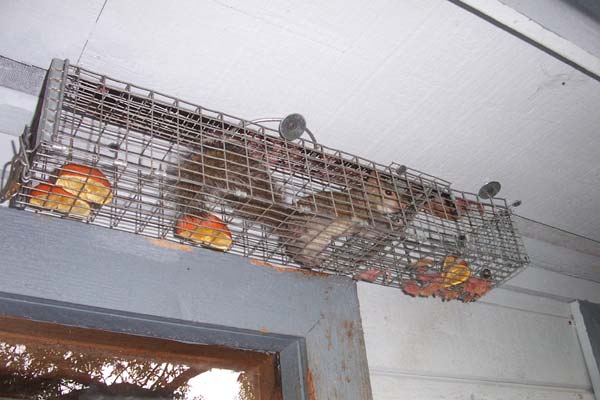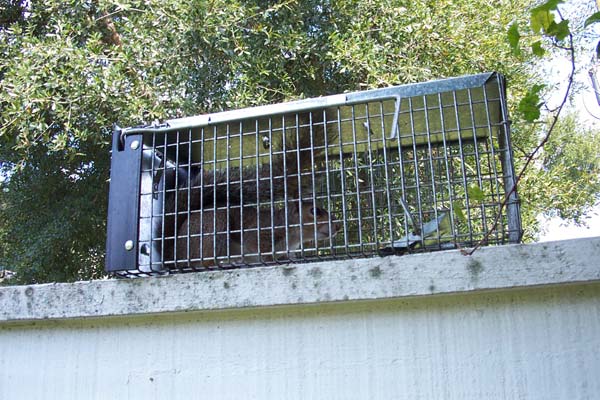-
info@aaanimalcontrol.com
Call us for help in your town
Humane Wildlife Education
Squirrel Trapping - How to Trap Squirrels
Need squirrel removal in your hometown? We service over 500 USA locations! Click here to hire us in your town and check prices - updated for year 2020.
STEP 1) Buy the correct traps. If the squirrels are outside, you want a small-size cage trap, about 5"x5"x18". A large trap won't work well. If the squirrels are in the attic, you'd
be better off with a repeater trap that mounts on the entry/exit hole into the house.
STEP 2) Set the traps in the right areas. Traps tend to do better off the ground, bolted into trees or on the roof with a screw and large washer. If the squirrels are going into your
house, you can set squirrel traps on the roof near the entry holes, or better yet, mount a special one-way exclusion door or repeater trap right on the entry/exit hole.
STEP 3) Bait the traps with peanut butter and whole peanuts in the shell.
STEP 4) Check the traps every day. Do not let a squirrel suffer in a cage trap, especially in the sun. If you are having trouble catching squirrels, it's most likely due to the location
of the traps.
Click here for my nationwide list of 100's of professional squirrel control experts!
Most squirrel traps are cage traps, typically the ones designed for smaller mammals, perhaps squirrels in particular. You can trap a squirrel in a cage trap by
baiting it with various nuts or peanut butter. The type of bait is not nearly as important as several other factors, such as type of trap and setup and location.
Any person can buy a trap and set it (you'd be amazed at how many traps I see novices set completely incorrectly), but as with any skilled profession, it takes
knowledge to do it right. For some animals, such as squirrels, location can be extremely important. Presentation is a key factor, access to cover, sunlight,
and many other factors all play an important role.
 |
 |
Here are some photos of different types of squirrel trapping. The first is a trap mounted right under a soffit, where the squirrel was coming in and out, and the second photo is a regular cage trap set up on a wall that the squirrel was using to run onto the roof of a home.
Here are some links to other helpful articles I've written:
How much does squirrel removal cost? - get the lowdown on prices.
Example squirrel trapping photographs - get do-it-yourself ideas.
Squirrel job blog - learn from great examples of squirrel jobs I've done.
Of course, there are many subtleties to trapping that one only gains through years of experience, and I'm usually surprised to see homeowner attempts at squirrel
trapping fail due to little mistakes that I don't even think about. I'm only talking live trapping here, because lethal trapping isn't legal in my state, and I
prefer live trapping regardless. Practically no novice would ever be able to purchase or operate a lethal trap properly, and I wouldn't recommend it.
A lot of people can manage to catch a squirrel in their cage trap, but simply trapping an animal is by no means a total solution to the problem. The presence of the animal is a symptom of some other problem, namely the attraction of the area to the animal. Furthermore, here's a scenario that I commonly deal with from homeowners: I get a call saying, "hey, I caught a squirrel in my trap, now what do I do with it?" You probably can't legally do anything with it, other than release it on your own yard, which won't do any good, and will only create a trap-shy animal. There's a reason that professional trapping companies exist, and if you want to have the problem solved correctly, I recommend that you call one.
Squirrels cause a number of problems for people. The most common conflicts that occur with squirrels involves their desire to live inside of buildings. Like all members of the rodent family, squirrels are excellent chewers, and they will chew their way into your home or commercial building. Once inside, they may even chew on wires or pipes! People often hear the squirrels running about in the attic or ceiling. They often bring in nesting debris, and can create a fire hazard, not only due to the debris, but also by chewing electrical wires. Squirrels will also chew on the woodwork of a home. Everyone knows about how squirrels steal food from birdfeeders, but that problem can be solved by buying squirrel-proof feeders. Squirrels have two litters per year, and reproduce quickly, like all rodents. This means that at times the squirrel population can grow to high numbers, and extra pressure is placed on buildings. Squirrels will move into attics or chimneys, or even places like drier vents. Most trained wildlife control professionals have excellent experience in solving squirrel problems, so if you need squirrel control, click the links on this page to find a wildlife removal company in your neck of the woods, and get rid of those squirrels once and for all.
AAAnimal Control is a professional nuisance wildlife control company located in Orlando, FL. We offer solutions to wildlife problems throughout the Greater Orlando Florida area, including squirrel control. Wildlife services include animal trapping, capture & removal, plus animal damage repairs and preventative measures. We also offer biological cleanup and many other services. Give us a call at 407-729-6946 any time to discuss your wildlife management issue and schedule an appointment. You can always browse this site for more details and info, and you can even check out prices ahead of time. If you live elsewhere in the US and have found this site and need a local trapper in your area, click here for a nationwide list of 100's of professional squirrel removal experts.



















